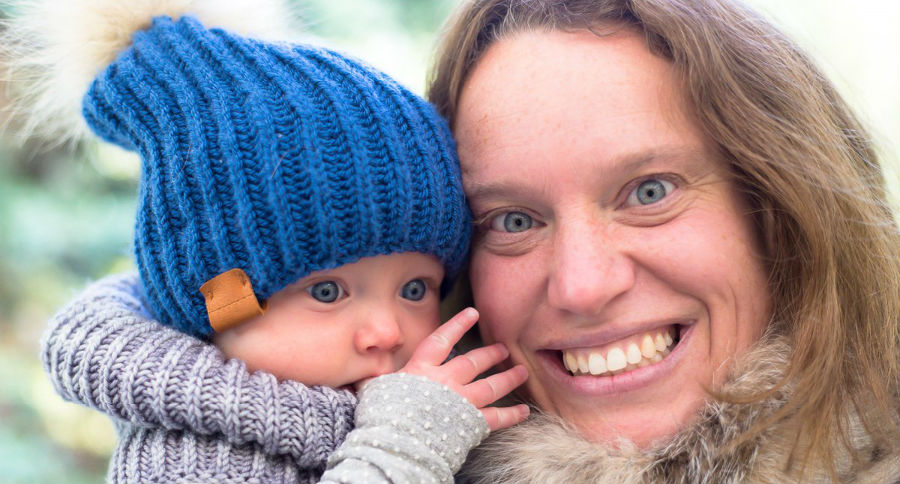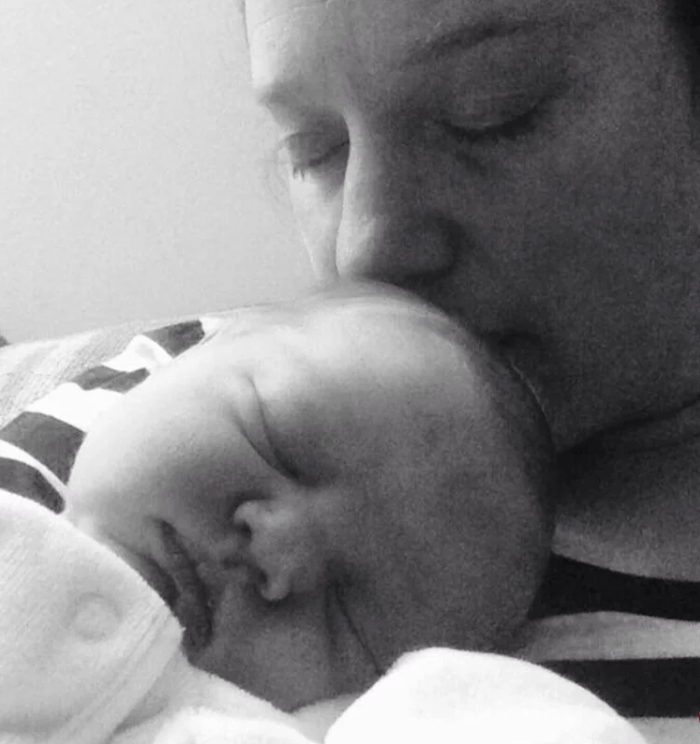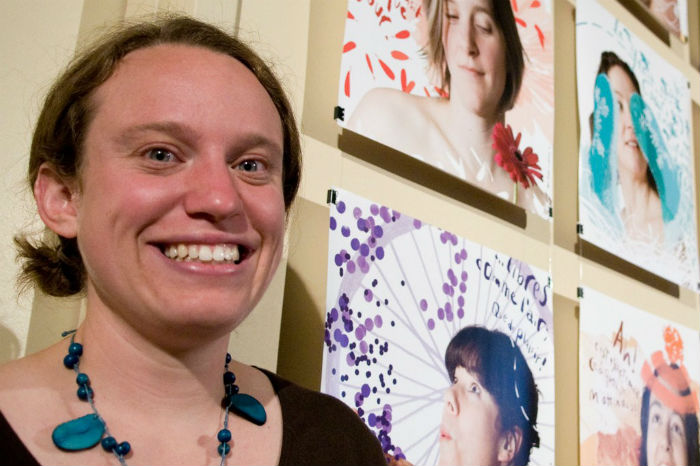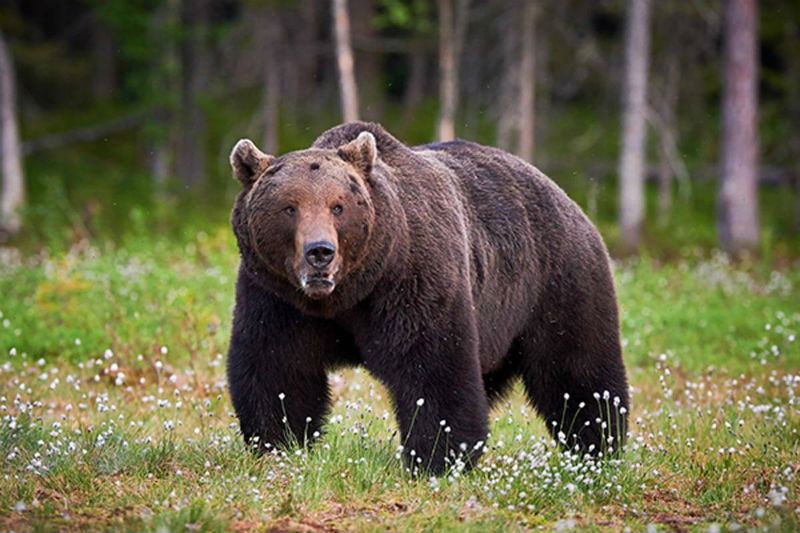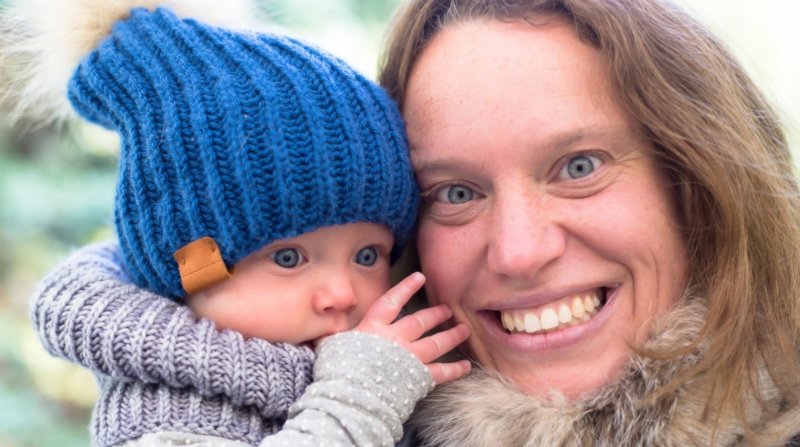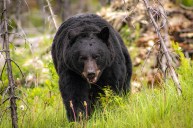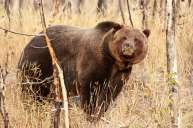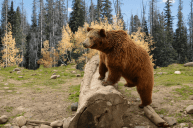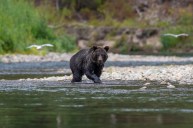A Yukon mother and baby daughter were recently mauled and killed by a grizzly bear. Jim Shockey delivers a righteously angry reaction.
By now most of us have heard about the horrific deadly mauling of a mother and her 10-month-old daughter by a grizzly bear. Both 37-year-old Valerie Theoret and her infant daughter Adele Roesholt were found dead Nov. 26 by Theoret's husband, Gjermund Roesholt, near Einarson Lake in the Yukon.
Theoret and baby Adele were found outside their remote cabin in the Canadian wilderness. Moments before their discovery by Gjermund, the trapper had returned home from a day on the trapline only to be confronted by the bear that was responsible for killing his wife and daughter.
The bear charged about 100 meters from the family's dwelling before Gjermund shot and killed it. He then returned to his cabin only to discover the bodies of his wife and daughter.
Theoret had been on maternity leave from her job as a sixth grade French Immersion teacher at Whitehorse Elementary School. The couple had been running a trapline for about three months is the East-Central area of the Yukon territory, near the Northwest Territories border in Canada.
The Royal Canadian Mounted Police responded to Gjermund's emergency radio call to the tiny village of Mayo for help. The Yukon coroner's service issued a statement stating suggesting that the mother and her daughter were attacked not long before Gjermund's return to the cabin.
"It appears they had been out for a walk when the incident occurred, sometime between 10 a.m. and 3 p.m.," the coroner's news release said.
The Yukon community grieves
The community has rallied around Gjermund, supporting him in every way possible.
"It's a big, big blow. Everybody is totally devastated right now," said family friend Rémy Beaupré. "Lots of our friends are gathering tonight to mourn a little bit and support each other a little bit."
Brian Melanson, a fellow trapper in the area, echoed Beaupré's emotion.
"It's going to be devastating to the community, because it's going to hit home to everybody," he said. "You know, we go out there, all of us, we take our wives and our children, and we live out there."
Melanson told CBC News that grizzly bears are a part of life in the bush.
"We had seen bear tracks out even in the middle of December last season," he said, "...the mild falls, you know, they're still out and roaming around."
He also said Gjermund's family was competent and experienced, implying the tragedy could've happened to anyone. "These are competent bush people," he said. "It's not from lack of experience.
Jim Shockey responds with anger and frustration
Famed hunter conservationist Jim Shockey took to social media after hearing of the tragedy. He pulled no punches. While admitting to his grief and anger, Shockey declared that the fatal bear attack may have been prevented were it not for politicians who prevent sensible bear quotas from being enacted and the ignorant animal rights, anti-hunting crowd that pressures and supports this kind of political decision making.
Here is Shockey's social media post. As he says, it is a long post, but it is passionate, accurate and righteous in its anger and demand for accountability.
This will be a long one. A really long one.
Right now I am deeply saddened and very angry.
We are so sorry for the loss of Valerie and Adele and extend our deepest sympathies to Gjermund Roesholt...Valerie's partner, Adele's Father and who is a survivor of this tragedy and to their family, friends and community. You are all in our thoughts and prayers.
Two days ago, I received a call, asking permission for the Royal Canadian Mounted Police (RCMP) to use one of our cabins at Einarson Lake, in our Yukon Rogue River Outfitting Territory. If you have followed our Hunting Adventures TV show, you will have seen many episodes filmed at that camp.
With that phone call, I learned of the horrific tragedy that had just occurred at Einarson Lake, that by now, most of you will have heard about from the Mainstream Media. A grizzly bear, attacked and killed a young mother, Valerie Theoret and her beautiful 10-month old baby girl Adele.
The deep sadness I will deal with in my own way, with time helping to numb the horror I feel at such an incomprehensible, senseless and preventable loss of life.
The anger, I will deal with right now, specifically the "preventable" part of this tragic event.
I had a long post, that I'd written immediately after receiving the phone call, before this all hit the mainstream news outlets, but I decided not to post it. I decided to take a breather, to cool down before I pushed the "Send" button.
Unfortunately, I have not cooled down.
I am still livid at this senseless loss of human life in "My House" and on "My Watch."
A few years back, you may remember, we aired an episode from this very same Einarson Lake, where one guide had to shoot an kill a grizzly bear as it tried to break into another guide cabin, obviously with the intent to kill and eat the person inside that cabin. The "Rest of the Story" is that my guides shot 17-times, the previous afternoon, around, over and beside that grizzly, trying to haze it away from the camp.
In spite of the fact that that bear was obviously a threat to humans, my guides did not shoot the bear itself, because they are law-abiding citizens and it would have been a serious violation of the Yukon Wildlife Regulations to kill the bear, without a direct threat to property or life.
Instead, my guides literally had to wait until the grizzly made its attempt to kill a human, before they could legally kill this problem bear. It is in essence, the "Rules of Engagement" that we are forced, by law, to live with in the wilderness areas of the Yukon and British Columbia. Rules of Engagement, that someone who has never faced a dangerous bear, wrote TO SAVE THE LIFE OF THAT GRIZZLY AND OTHER GRIZZLY BEARS, not to save the lives of the human beings living and working in remote areas.
After that unfortunate incident at Einarson Lake and many other close calls with the grizzlies in that general area of the Yukon, close encounters, I warned everyone who I could reach, that "We are facing a grizzly bear plague in British Columbia and the Yukon." And we informed the officials in charge of the highly regulated grizzly bear harvest quotas, that more grizzlies needed to be killed in the wilderness areas, particularly in that "Grizzly Bear Management Zone" that includes Einerson Lake. In fact, I predicted that someone was going to get hurt if something wasn't done to deal with the grizzly bear plague.
Now this prediction has come to pass, in the most tragic way.
Was it preventable? I believe yes, absolutely, but I know I can't say that, I can only say, yes, probably.
Even back in August of this year, it is highly likely that I personally saw the bear that killed this young lady and her beautiful baby girl. But due to the regulations, I was not allowed to kill a grizzly bear at Einarson Lake this year. Licensed hunters are allowed to take one grizzly bear, every three years in the Yukon. Since I took an old, nearly toothless grizzly boar, aged by biologists at over 20-years, back in 2016, I could not shoot a grizzly at Einarson Lake when I hunted there this year. If I could have, there is a probability that I would have killed that grizzly bear three months before it killed Valerie and Adele.
Further to this, in spite of my constant battle to try and have the Grizzly bear quota raised in that remote region, we have only been allowed by law, to harvest from one to three male grizzlies per year, on average, over the 15 or so years that I've owned the Rogue River Outfitting Territory. For the record, the Grizzly Bear Management Zone that Einarson Lake is situated in, encompasses over 4000 square kilometres. IF the grizzly quota had been increased, to a level that it must be to prevent tragedies like this from happening, there is a high probability, that one of our Rogue River clients would have killed that grizzly long before it had the opportunity to kill Valerie and Adele.
Here is the part that really gets me angry. Right now, as I write this, there are people out there, who believe animals have rights and who are celebrating this horrific tragedy. They will say to each other, in their nasty little covens, that Valerie and Adele simply reaped what they sowed. This was a family of trappers, a family of hunters. They deserved what they got.
I am angered and outraged. So should every sentient human being be.
These same people will be out tomorrow, raising money to stop hunting around the world and they will lie to do so. They will "personify" wild animals, give them cute names and show out of context photos of suffering animals, and they will tell people that hunting is "inhumane" that hunters are evil. They will tell this to concerned citizens who are not aware that hunting is in fact the best and only way to manage wildlife populations in many parts of the world. They will not mention that hunters are this world's greatest stewards of wildlife. The will not talk about the billions of dollars hunters have spent to protect wildlife, to raise wildlife populations here in North America, to historic highs.
In their dark recesses, they will compose and send death threats to hunters and their families. They will bully and vilify young ladies who follow an outdoor lifestyle. And then in public, they will lie about the populations of grizzly bears. They will say they are "endangered" and they will pull at the heart strings of uninformed, caring people, who mostly live in urban centers far removed from the realities of grizzly bear management and conservation.
And as they cry...they will reach into these well-intentioned people's pockets to finance their next anti-hunting project, NOT to actually use the funds to help wildlife populations thrive and increase as hunters have done.
This sickens me.
Yesterday, I was called for an interview by our own Canadian network, CTV, asking me questions about this horrible tragedy. I told them about the grizzly bear plague, that there are too many grizzly bears in British Columbia and the Yukon. I told them how we'd warned that someone was going to get hurt or worse in that part of the world. I told them about the onerous "Rules of Engagement" for problem grizzly bear encounters in both British Columbia and the Yukon Territory.
And when they asked me "Why I thought this grizzly attacked" I told them this grizzly was no different than any grizzly. It attacked because it is an apex predator and apex predators kill anything and everything they consider "prey." And when you regulate grizzly harvest numbers to the point that they lose their "fear" of human beings, then human beings will absolutely become "prey" to grizzly bears.
And I told them that this wasn't a "one off" situation, THIS IS JUST THE BEGINNING.
When the report on CTV came out yesterday evening, instead of my personal, feet on the ground at Einarson Lake answers to their questions, they quoted an "Expert", the "grizzly bear recovery coordinator" for the US Fish and Wildlife service, from Missoula, Montana. An expert who "has investigated the last eight fatal grizzly bear attacks in the United States."
This gentleman said that it was "important to try to understand why it happened..." "...through careful re-creation of the events."
He said..."Was it in poor shape? Was he old? Did he have bad teeth?" And that these things would give information about the "...potential motivation of the bear."
He added that grizzly bears "...become stressed while looking for food at this time of the year."
Stressed? Motivation? Understand?
WHERE IS THE COMMON SENSE TODAY???????!!!!
This WAS NOT A HUMAN BEING WITH A SAD SOCIAL ISSUE!!!!
This bear was a GRIZZLY BEAR!
It killed because it is a predator!
IT KILLED VALERIE AND ADELE BECAUSE THAT IS WHAT GRIZZLY BEARS DO!
I'm venting. Senseless and preventable tragedies don't bring out the best in me.
Today as I write this, there are politicians in power, who know absolutely, that they have done "wrong" to remain in power, they have purposefully catered to the populist majority urban vote, instead of doing what is right for the minority of people who live in the rural areas of our countries. It's called "demagoguery" and recently I've posted about exactly this on the new Canadian federal gun control regulations about to be enacted.
In British Columbia, the one common sense method to control the rising and likely out of control grizzly bear population, hunting, was recently banned for 100% political reasons. I believe the official statement said something to the effect that this ban was put in place, because grizzly bear hunting was no longer socially acceptable to the majority of British Columbians. This was doing "wrong" simply to stay in a position of power, and the politicians responsible cannot reasonably deny it.
These politicians were told there was no biological reason for banning the hunt, the grizzly bear population was stable and even growing. And the politicians were warned that increasing grizzly bear populations, would inevitably result in human\grizzly conflict and tragedy, loss of human life. A senseless waste of human life. And yet, knowing that people in rural areas would die, savaged by grizzly bears, because of their decision, they enacted the law anyway. Enacted the law to remain in their position of power?
So here is the question that I would really like answered. Who will be accountable when that tragedy happens in British Columbia? Who takes responsibility? Who will say, "Yes, we were warned, but we felt the horror this person or persons (in the case of Valerie and Adele) was simply the cost of doing business...the cost of us staying in power."
What government official will stand up and say, "Yes, it was me. I'm the one who decided grizzly bear harvest quotas should remain low, in spite of the fact that I was warned far in advance, by the people who actually live and work in that area, that a tragedy such as has just happened to Valerie and Adele, was going to happen in that area."
Will any government employee or elected politician stand up and say, "Yes, I was warned a tragic loss of life would result in my making this law, but I decided that it was in the better interests of the urban public I serve, to have more grizzly bears in the areas that rural people live and work."
Who do we hold accountable?
So, who?
While such occurrences with dangerous predators are relatively rare, that's little consolation when they could have been prevented by adhering to biologically supported game quotas or rules for encountering dangerous bears. But politicians and judges occasionally disregard those quotas, feeling who bow to pressure from an ill-informed public and manipulative anti-hunting and animal-rights groups.
Last year, we saw British Columbia succumb to the pressure of animal rights groups and enact an outright ban on grizzly bear hunting in the province. Shockey alluded to it in his social media comment above. This despite the fact that bear biologists and people in the field fervently supported the annual hunt that kept the bear population in check and help fund wildlife management.
At the time, the B.C. Forests Minister threw science out the window.
"It is no longer socially acceptable to the vast majority of British Columbians to hunt grizzly bears. That's the message."
That statement was strongly disputed by the B.C. Wildlife Federation, which said that the public opinion polls were designed to elicit a negative response. But even if it were true that the majority of the public was opposed to bear hunting, is that a legitimate reason to abandon science and sound conservation practices? I think not.
We're currently seeing similar, seemingly questionable decisions related to wildlife management in the United States. This year a federal judge in Montana effectively blocked scheduled grizzly bear hunts in Wyoming and Idaho (in the poorly named "Greater Yellowstone Area"). Many view the judge's actions as activism from the bench, and another example of disregarding wildlife science for the sake of politics. I don't know if that's a fair assessment or not.
But this kind of animal-rights activism is having a chilling effect on wildlife management across the country, and on other species besides grizzly bears. The New Jersey governor recently banned black bear hunting on public lands, a decision that is being fought by outdoors groups who ostensibly have a greater understanding of bears than the governor does.
In Wisconsin and other states anti-hunting groups have had tremendous success is thwarting game management goals concerning wolves. While wolf populations continue to skyrocket, these groups have been able to stop hunts by enlisting the help of presumably activist federal judges.
The big predators—bears, wolves and mountain lions—continue to increase in population across North America. At the same time, human participation in the great outdoors has never been higher. People are hiking, wildlife watching, camping and enjoying nature in record numbers.
As the populations of big predators continue to increase unabated by hunting and sound management, human encounters will surely rise as well. Already we've seen an increase in encounters with grizzly bears, including deadly encounters.
Just two years ago, for example, a 38-year-old U.S. Forest Service officer was attacked and killed by a grizzly bear as he was biking through Montana's Glacier National Park. Since 2010, there have been at least six fatal grizzly attacks in the Yellowstone region in Montana, Wyoming and Idaho.
An increase in these types of encounters will also no doubt lead to more unnecessary wildlife deaths. Not to mention creating a serious imbalance between prey species and predators. Nature does not balance itself. Left to its own devices, nature is a constant cycle of boom and bust wildlife populations.
We simply cannot allow the animal rights, anti-hunting crowd to win the day as it concerns wildlife management. That's a recipe for disaster for both humans and wildlife.
No one wants to extirpate these big predators completely. Most hunters support the idea of having apex predators on the landscape. I know I do. I certainly don't want to give the impression that they're they evil bringers of death and carnage. Predators simply do what they do.
There's no psychological motive behind their actions. They cannot be blamed for their behavior. Predators play an important role in nature and the wilderness experience, both biologically and romantically, and should be valued and appreciated.
But their numbers need to be managed the same as all other game animal species. That is why we have wildlife departments, biologists and game quotas. To ignore those quotas and suggestions will surely lead to more preventable deaths, for both humans and wild predators.
Only the beginning
I believe Jim Shockey is right. This may well be only the beginning of the kinds of tragedies we will see if this anti-hunting/animal rights madness continues.
The horrific tragedy that befell Theoret and her 10-month-old baby will likely repeat itself with some other unlucky hiker, wildlife watcher or camper. The added horror of this incident is of course the fact that a small child was involved.
"Of course it's a tragedy," said Isabelle Salesse, Theoret's friend and the executive director of the Association Franco-Yukonnaise, an organization in Whitehorse that supports French-speaking Yukon residents and causes. "That her baby was with her and died as well, it's even worse."
It's time for a change, a change in thinking from politicians and judges who have up to now chosen to ignore the science of game management and wildlife conservation. We cannot, of course, prevent every encounter with grizzly bears or other predators. Humans will hopefully continue to participate in nature in increasing numbers. The more people who participate in the wild, the better it will be for conservation our collective psyche.
But some of the rules and laws that, as Shockey mentioned, prevent dealing with dangerous apex predators in a timely manner are foolhardy and will lead to more preventable tragedies. Particularly as the populations of these big predators outgrow their endangered species protection status.
If we can condense this situation into one neat phrase it might be this: We need balance in nature. As we said earlier, nature, by itself, is an imbalanced system (from a human perspective). But humans demand balance. And we have the wherewithal to alter and create a more- or less-balanced system in nature, one where there is both an abundance of wildlife and one that allows us to participate in it without undue danger from overpopulated predators that have no fear of humans.
Like what you see here? Experience more articles and photographs about the great outdoors at the Facebook page, Stumpjack Outdoors.
NEXT: FAMILY DESCRIBES THE CHILLING EXPERIENCE OF TWO GRIZZLIES LAYING SIEGE TO THEIR HOME
WATCH
https://rumble.com/embed/u7gve.v3trxt/
